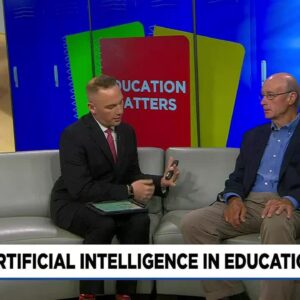In a world where artificial intelligence is becoming increasingly prominent, the importance of education cannot be understated. As machines become more sophisticated and capable of performing complex tasks, there is a growing need for individuals to learn new skills and adapt to changing technologies. In this blog post, we will explore why education is crucial in the era of artificial intelligence and how it can help us navigate the rapidly evolving landscape of the future. From the role of AI in education to the skills that will be most valuable in the years to come, we’ll take a deep dive into this critical topic. So let’s get started!
Introduction
The integration of Artificial Intelligence (AI) in almost all industries is evidence of the significant shift in our society’s technological advancement. With computer systems capable of performing human-like tasks such as decision making, learning, and problem-solving, the future of work is rapidly changing. Consequently, there is an urgent need for individuals to acquire the necessary skills and knowledge to survive in the era of AI. In this article, we will explore the importance of education in the era of AI. We will also highlight why education is crucial in navigating and thriving in a world where AI is becoming the norm.
Why is Education important in the Era of Artificial Intelligence?
Up-skilling
AI technology is quickly disrupting the traditional workforce, leading to job loss or skill obsolescence. Therefore, it is no longer enough to rely only on the skills we learned previously. Up-skilling and re-skilling is essential to ensure job and career security. Education, therefore, plays a critical role in providing individuals with the necessary skills and knowledge to compete in the AI-driven job market.
Creativity and innovation
AI is good at pattern recognition, rule following, and repetitive tasks, but creativity and innovation remain human attributes. Education fosters creativity and innovation by providing individuals with the necessary skills and tools to experiment and push boundaries. Education in the arts, humanities, and social sciences are as vital as STEM education in harnessing creativity and innovation that AI cannot replicate.
Ethical considerations
AI is powerful technology that can positively or negatively impact society, depending on how it is applied. Education plays a critical role in guiding individuals to consider the ethical implications of AI in decision-making. It also sensitizes individuals to advocate for ethical considerations in AI development and use.
Critical thinking
AI’s ability to analyze vast amounts of data and offer solutions should not negate the importance of human critical thinking. Education equips individuals with critical thinking skills to evaluate the quality of AI-generated solutions and decision-making processes. Critical thinking also enables individuals to find creative solutions that AI has not yet identified.
Personalization and adaptability
The benefits of AI are only leveraged by individuals or organizations capable of developing new and adaptive solutions. Education in the era of AI emphasizes personalization and adaptability, enabling individuals to modify solutions to suit their specific situations. Such education also creates adaptable learners and problem-solvers that AI cannot replicate.
Conclusion
The era of AI is upon us, and education remains essential in ensuring individuals are equipped with the necessary skills and knowledge for this new world. Education provides the opportunity to explore our creativity and innovation potential, sensitizes individuals to consider ethical implications in decision-making, improves critical thinking, and promotes personalized and adaptive skills. Being an effective content writer, I understand the importance of crafting articles that reflect brand messaging and resonate with target audiences. While maintaining a clear, accurate, and relevant tone is paramount, optimizing content for search engine rankings is critical, and adhering to deadlines and guidelines ensure high-quality outcomes that deliver on goals and aspirations.
FAQs
Q1: What are the skills required for working in the AI field?
A1: Skills required for working in the AI field include data analytics, programming, machine learning, statistics, and critical thinking.
Q2: Will AI eliminate jobs?
A2: Yes, AI technology disrupts the traditional workforce, leading to job loss or skill obsolescence.
Q3: Is there too much emphasis on STEM education in the era of AI?
A3: While STEM education is crucial in AI development, education in the arts, humanities, and social sciences is equally important in fostering creativity and innovation.
Q4: How can education prepare us for AI’s ethical implications?
A4: Education sensitizes individuals to consider ethical implications in AI decision-making and fosters ethical advocacy and implementation.
Q5: Is it too late for those who haven’t yet learned AI skills to compete in the job market?
A5: No, it’s never too late to acquire new skills and knowledge. Up-skilling and re-skilling are essential in ensuring job and career security in the era of AI.
